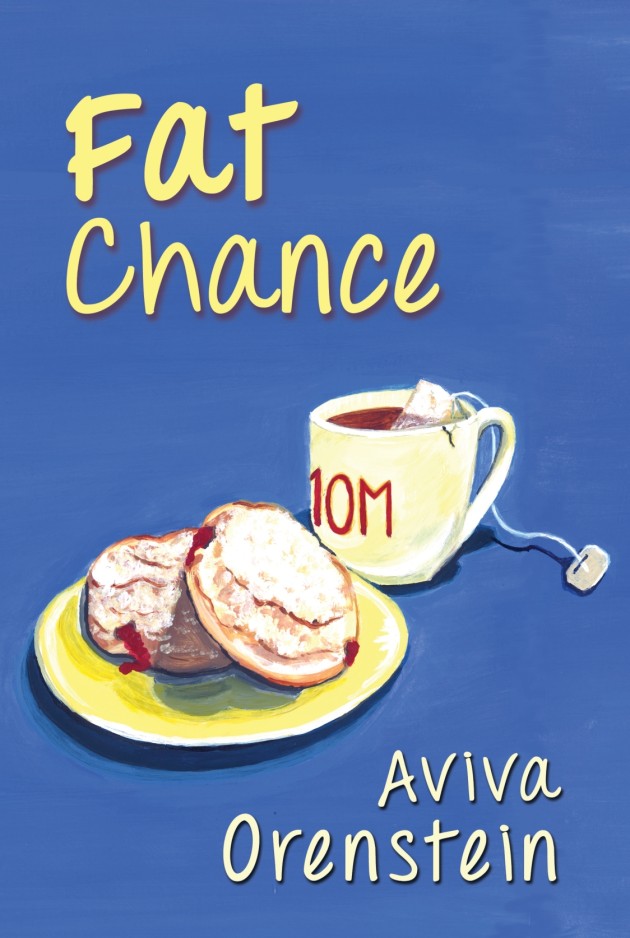
by Yona Zeldis McDonough
Aviva Orenstein, Author of “Fat Chance,” Talks Fat as Feminist Issue and Jewish Women and Food
 Confident at work but clueless at love, Claire is forty and zaftig—not a combo that she imagines can resolve the romance gap. Dealing with her father’s death and an angry teenager doesn’t make things any easier. With no help from her ex, who is distracted by remarriage to a much younger woman, Claire copes by relying on a faithful circle of friends, a wicked sense of humor, and a new interest in fitness here. When she meets Rob, a beguiling, slightly pudgy man at the gym, there is an instant connection that she hopes will lead to more. Maybe, just maybe, she can haul the composure she finds at work into the gym with her…
Confident at work but clueless at love, Claire is forty and zaftig—not a combo that she imagines can resolve the romance gap. Dealing with her father’s death and an angry teenager doesn’t make things any easier. With no help from her ex, who is distracted by remarriage to a much younger woman, Claire copes by relying on a faithful circle of friends, a wicked sense of humor, and a new interest in fitness here. When she meets Rob, a beguiling, slightly pudgy man at the gym, there is an instant connection that she hopes will lead to more. Maybe, just maybe, she can haul the composure she finds at work into the gym with her…
This is the premise for a debut by attorney-turned-novelist Aviva Orenstein. Orenstein writes with verve and wit, and her decision to have an overweight character at the center of her novel practically constitutes a political act. She chats via email with Lilith fiction editor Yona Zeldis McDonough to discuss the underpinnings of her new book, her legal background and what she hopes will be in store for sassy, smart-mouthed Claire.
YZM: Susie Orbach wrote the landmark book Fat is Feminist Issue in 1978. How do you think the idea in that title relates to Claire?
AO: I think that Claire recognizes and agrees with the assertion that fat-shaming of women raises important feminist concerns. Women preoccupied with their appearance and weight can be distracted from important political, social, and feminist issues. Claire’s intellectual appreciation of that does not always translate into self-confidence or self-acceptance. She struggles against self-criticism and obsessive concern about appearance. Happily, this is an area where she makes some headway over the course of the book.
YZM: Do you think Jewish women have a particularly charged relationship to food and eating?
AO: Women’s issues with food are not uniquely Jewish, but Jews’ use of food for celebration and for healing reinforce both the pleasurable and the painful aspects of food and eating. Women’s cooking is a deep part of Jewish tradition and expression of love, as when Claire makes her Grandmother’s chicken soup when Rob gets the flu. Because Jewish eating is very ritualized via the do’s and don’ts of keeping kosher, eating can feel morally laden and restrictive. Claire affirmatively eats bacon sometimes to be transgressive or to express anger at God. In fact, Claire often eats as a way of tamping down her feelings. The family orientation of eating can sometimes make enjoyment of food fraught, evoking negative family dynamics and unhappy memories of times around the dinner table. These mixtures of pleasure and pain, indulgence and restriction explain the conflicted attitude Jewish women have around food. Throw in pressure to be slim and to engage in self-denial, and one has a recipe for a very screwed up relationship with food and eating.
YZM: You’re a lawyer by training; how did that inform the writing of the novel?
AO: I volunteer to help women secure protective orders, so I am personally familiar with the legal process described in the book. Claire is a lawyer and a Cornell Law grad like me. I tried to strip my prose of all the legalisms and pompous style that occasionally creep into my regular speech. You won’t find too many “furthermores” and “therefores” in the text.
YZM: Does the Jewish community you write about mirror your own?
AO: The Jewish community in Fat Chance is more like where I grew up, South Orange, New Jersey, than my adopted hometown of Bloomington Indiana. It is an invention, as is the Rabbi in the book. (My mother the Rebbetzin and my sister the Rabbi are very keen that I point out that the rabbi in Fat Chance bears no resemblance to my late father, Rabbi Jehiel Orenstein, or my sister, Rabbi Debra Orenstein.)
YZM: Do you think Jewish life in a small town is more cohesive than in a big city?
AO: I do, but Hudsonville in the story is more a New York City suburb than a small town. One of the wonderful things about a town like Bloomington is that we all daven and hang out together even though we come from very different backgrounds. That’s for another book.
YZM: What’s next on your horizon?
AO: If Fat Chance takes off, I hope to continue writing about Claire. My plan is to have her in the courtroom more often and to develop a love interest with someone kind, Jewish, and pathologically messy—and who beats her in court.